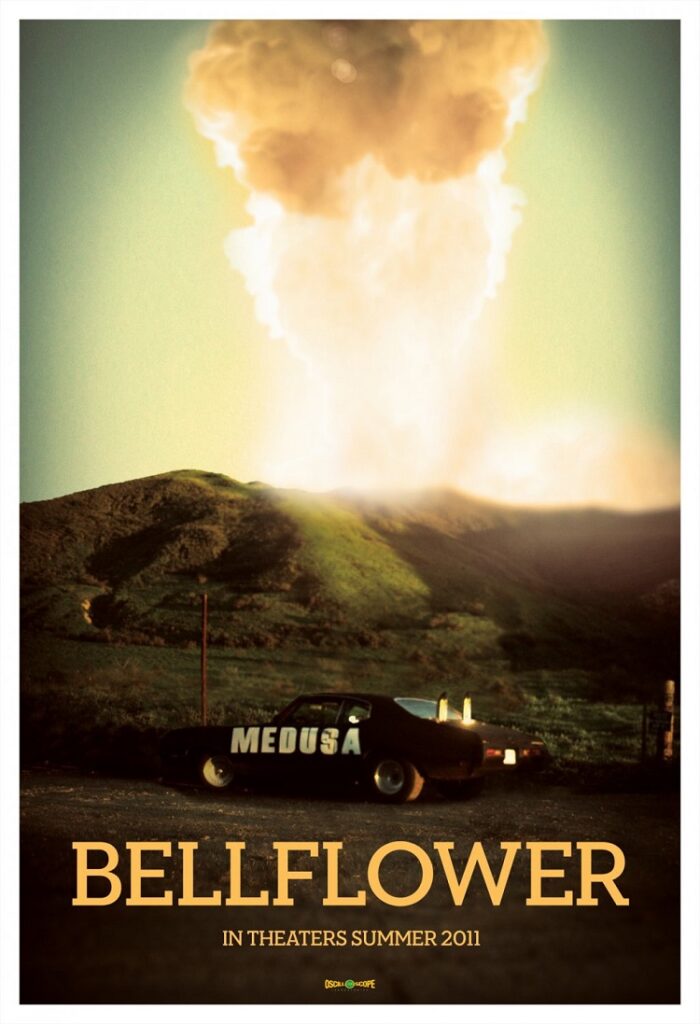
Love is a battlefield, as Pat Benatar reminded us back in the ’80s. Nowhere is that fact more evident than in Bellflower, actor/director Evan Glodell’s stylishly violent romantic tragedy, opening this weekend in New York and Los Angeles.
Over the course of two hours, the five leads in this love pentagon are hit by cars, beaten with baseball bats, assaulted with knives, forcibly tattooed, attacked with weapons of mass destruction, shot in the head, and betrayed in their own beds. But it’s the infidelity that provides the deepest and most long-lasting wound, as anyone who’s been cheated on already knows.
On a first date, if a potential significant other warns “I’ll hurt you and I won’t be able to help it,” take his or her word for it, and forego the follow-up. That’s one of the many things you can learn from Bellflower. You may also discover: how to build a flamethrower, the best techniques for pimping your ride in preparation for the Apocalypse, and that “propane is for pussies.”
All valuable pieces of information, particularly if you’re early in your dating career.
In a sun-scorched L.A. suburb, Wisconsin ex-pats Woodrow (Glodell) and Aiden (Tyler Dawson) meet Milly (Jessie Wiseman) and Courtney (Rebekah Brandes) during an epic night of dive-bar drinking. Nerdy Woodrow hits it off with party girl Milly, and the two embark on a booze-and-codependency-soaked love affair, despite Milly’s protestations. When her initial prediction comes true, Woodrow reacts violently and all the friends, including Milly’s “roommate” Mike (Vincent Grashaw) are dragged into the Armageddon.
Simultaneously, Woodrow and Aiden spend all their free time planning for the aftermath of a nuclear holocaust, living a dream forged during repeated childhood viewings of Mad Max. They troll military supply shops, conduct weapons testing in the desert and customize their 1972 Buick Skylark with a smoke screen, video surveillance system and flame throwing exhaust pipes.
“Imagine the Apocalypse is just beginning,” Aiden says, early in the film. “And no one is ready.”
Ironically, Woodrow and Aiden are fully prepared for life on “The Day After,” but clueless about what to do today. They stumble through most of the film drunk and/or high, with no discernable sign of employment or interest in a career path. In fact, none of the characters seem to have jobs, yet they always have enough money for beer, diesel fuel or handguns.
It’s possible that Glodell has a point to make about today’s crop of Post-Bailout Milennials, and their growing epidemic of nihilism. Or maybe it’s about the “Mancession” — the creeping sense of irrelevance felt by young men as women evolve past them, and the hostility it breeds. Or maybe he just wanted to blow shit up and take pictures of it in a way that feels unlike anything I’ve seen in recent memory.
Whatever his goal, he achieved it. And the result is one of the more memorable films I’ve seen this year.
Bellflower was reportedly produced for $17,000, yet it looks better than the product Hollywood is generating for exponentially more. Part of this is attributable to the custom camera rig that Glodell developed with cameraman Joel Hodge for the film, allowing him to create stunning, in-camera effects. Both the image quality and the editorial style contribute to the narrative in inventive ways; when Woodrow’s life starts to get ugly and disjointed, so does the film. The moody original music by Jonathan Keevil is also an important component of the storytelling.
The cast is uniformly strong, pursuing each scene with a naturalistic vibe that feels improvised, but is almost always narratively tight. Glodell makes for a charming main character, with a level of emotional vulnerability (and midsection paunch) you rarely see in Hollywood leading men. Wiseman navigates perfectly the twists and turns of her character, from sweetheart to betrayer. She’s both sexy and sad; addicted to the buzz of newness, yet clueless of how to maintain a commitment.
There’s a lot of laughing, crying, shouting, cursing, drinking, vomiting, nudity, and sex in Bellflower, like in all good relationships. Plus, it’s the rare film that spends as much time exploring the male-female love dynamic as it does on explosions.
What better compromise could you ask for on date night?